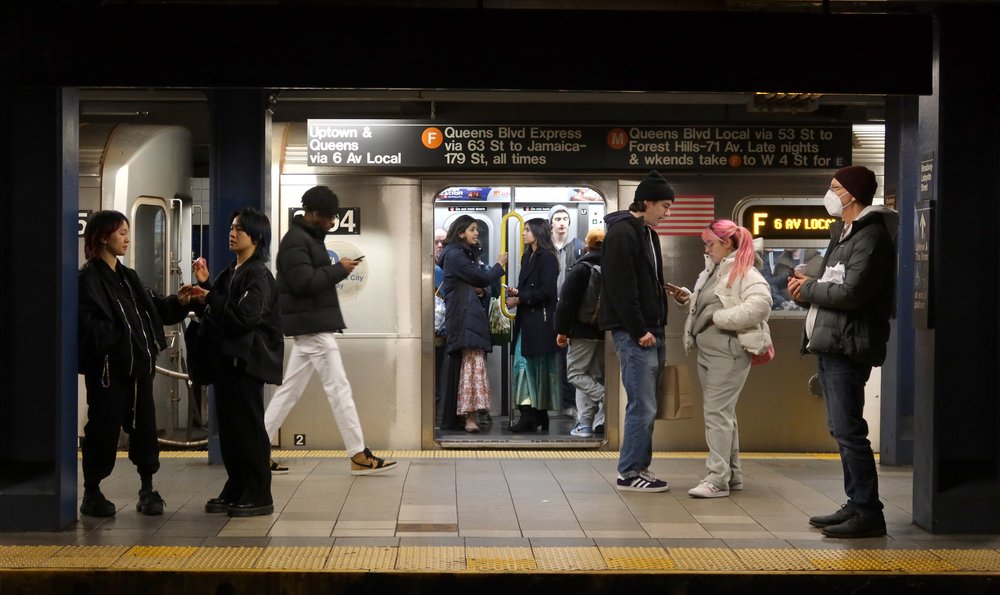Jordan Neely death: What charges could prosecutors bring?
May 4, 2023, 6:14 p.m.
Legal experts weigh in on the type of charges that could come down if prosecutors pursue a criminal case.

If the person who placed a 30-year-old Black man in a lethal chokehold on the subway is to face criminal charges, police and prosecutors will have to build a case showing his actions weren’t justifiable under the state’s penal law.
But even if they are able to do so, the case almost certainly won’t result in a murder charge, according to legal experts who spoke to Gothamist on Thursday.
The New York City Office of the Chief Medical Examiner determined Jordan Neely died of compression of the neck, ruling his death a homicide. That ruling opened the possibility of criminal charges against the man who was shown in a video placing Neely in a chokehold on the F train Monday as two others held his arms.
Catherine Christian, a private lawyer who spent 30 years in the Manhattan District Attorney’s Office, said the video evidence at this point would not support a murder charge, which under New York law requires the offender to show an intent to kill.
Instead, she said, prosecutors could consider second-degree manslaughter — which applies when someone “recklessly” causes a death — or criminally negligent homicide, a lower level felony. In either case, prosecutors would have to show the individuals who choked and restrained Neely didn’t have legal justification to do so — basically, that they weren’t reasonably acting in self defense, Christian added.
“That law is very friendly to a criminal defendant because it makes the prosecutor prove beyond a reasonable doubt that the defendant was not justified,” she said.
Under New York’s “justification” law, a person can use physical force in certain situations in which their safety is at risk, including if they are acting in self defense or defending a third party, according to Walter Signorelli, a former NYPD inspector who is now an adjunct assistant professor at the John Jay College of Criminal Justice.
Juan Alberto Vazquez, a journalist, shot the video of Neely’s death, which has circulated widely on social media. The video does not show the events prior to the chokehold, but a Facebook post attributed to Vazquez said that Neely, who was experiencing homelessness, had been yelling that he was tired, thirsty, willing to go to jail and ready to die.
Now, Christian said prosecutors and police are likely trying to gather as much evidence as possible depicting the events leading up to Neely’s death, including any possible surveillance footage from the subway platform or entrances showing how he was acting and whether he was in any way a danger to straphangers.
They’re also likely trying to contact any eyewitnesses, she said.
“I would hope that the police officers got the name and contact information of everyone in that subway car, because what people who weren't in the car are saying is irrelevant,” Christian said. “So I would want to know: What did they see? What did they hear?”
Signorelli said the man who choked Neely “has a right to defend himself and then to defend third parties,” but “of course it has to be reasonable.”
“Was [Neely] such a threat that it was reasonable for him to use force to try to control him, essentially making a citizen's arrest?” Signorelli said. “It might depend on what [Neely] was doing, and could the district attorney or the defense find these witnesses and get them to explain what threat the guy posed.”
Police had not made any arrests in the case as of Thursday evening. The Daily News reported that NYPD detectives and Manhattan prosecutors met over possible criminal charges over the day.
The NYPD, meanwhile, is calling for any additional witnesses to call its Crime Stoppers hotline.
Who was Jordan Neely? Friends recall ‘sweet kid,’ talented performer killed in subway chokehold. Black homeless New Yorker's 'chokehold' death ruled a homicide, medical examiner says